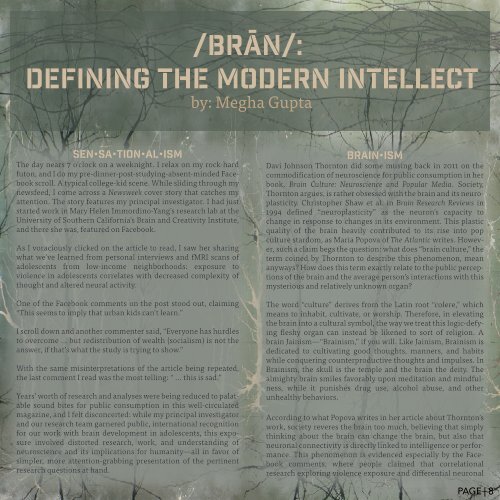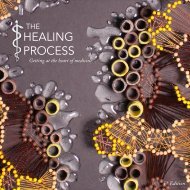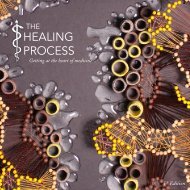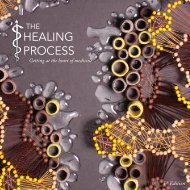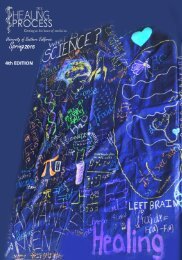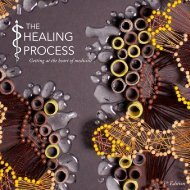final_thp_5thedition
You also want an ePaper? Increase the reach of your titles
YUMPU automatically turns print PDFs into web optimized ePapers that Google loves.
Brān/:<br />
defining the modern intellect<br />
by: Megha Gupta<br />
sen•sa•tion•al•ism<br />
The day nears 7 o’clock on a weeknight. I relax on my rock-hard<br />
futon, and I do my pre-dinner-post-studying-absent-minded Facebook<br />
scroll. A typical college-kid scene. While sliding through my<br />
newsfeed, I come across a Newsweek cover story that catches my<br />
attention. The story features my principal investigator. I had just<br />
started work in Mary Helen Immordino-Yang’s research lab at the<br />
University of Southern California’s Brain and Creativity Institute,<br />
and there she was, featured on Facebook.<br />
As I voraciously clicked on the article to read, I saw her sharing<br />
what we’ve learned from personal interviews and fMRI scans of<br />
adolescents from low-income neighborhoods: exposure to<br />
violence in adolescents correlates with decreased complexity of<br />
thought and altered neural activity.<br />
One of the Facebook comments on the post stood out, claiming<br />
“This seems to imply that urban kids can’t learn.”<br />
I scroll down and another commenter said, “Everyone has hurdles<br />
to overcome … but redistribution of wealth (socialism) is not the<br />
answer, if that’s what the study is trying to show.”<br />
With the same misinterpretations of the article being repeated,<br />
the last comment I read was the most telling: “ ... this is sad.”<br />
Years’ worth of research and analyses were being reduced to palatable<br />
sound bites for public consumption in this well-circulated<br />
magazine, and I felt disconcerted: while my principal investigator<br />
and our research team garnered public, international recognition<br />
for our work with brain development in adolescents, this exposure<br />
involved distorted research, work, and understanding of<br />
neuroscience and its implications for humanity—all in favor of<br />
simpler, more attention-grabbing presentation of the pertinent<br />
research questions at hand.<br />
Brain•ism<br />
Davi Johnson Thornton did some musing back in 2011 on the<br />
commodification of neuroscience for public consumption in her<br />
book, Brain Culture: Neuroscience and Popular Media. Society,<br />
Thornton argues, is rather obsessed with the brain and its neuroplasticity.<br />
Christopher Shaw et al. in Brain Research Reviews in<br />
1994 defined “neuroplasticity” as the neuron’s capacity to<br />
change in response to changes in its environment. This plastic<br />
quality of the brain heavily contributed to its rise into pop<br />
culture stardom, as Maria Popova of The Atlantic writes. However,<br />
such a claim begs the question: what does “brain culture,” the<br />
term coined by Thornton to describe this phenomenon, mean<br />
anyways? How does this term exactly relate to the public perceptions<br />
of the brain and the average person’s interactions with this<br />
mysterious and relatively unknown organ?<br />
The word “culture” derives from the Latin root “colere,” which<br />
means to inhabit, cultivate, or worship. Therefore, in elevating<br />
the brain into a cultural symbol, the way we treat this logic-defying<br />
fleshy organ can instead be likened to sort of religion. A<br />
brain Jainism—“Brainism,” if you will. Like Jainism, Brainism is<br />
dedicated to cultivating good thoughts, manners, and habits<br />
while conquering counterproductive thoughts and impulses. In<br />
Brainism, the skull is the temple and the brain the deity. The<br />
almighty brain smiles favorably upon meditation and mindfulness,<br />
while it punishes drug use, alcohol abuse, and other<br />
unhealthy behaviors.<br />
According to what Popova writes in her article about Thornton’s<br />
work, society reveres the brain too much, believing that simply<br />
thinking about the brain can change the brain, but also that<br />
neuronal connectivity is directly linked to intelligence or performance.<br />
This phenomenon is evidenced especially by the Facebook<br />
comments, where people claimed that correlational<br />
research exploring violence exposure and differential neuronal<br />
PAGE | 8


